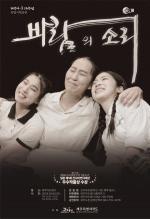- Dispatch 9 from the 6th Jeju Forum for Peace & Prosperity, May 27-29
 |
||
| ▲ Jeju Governor Woo Keun Min giving his opening speech to an international panel during the 6th Jeju Forum for Peace & Prosperity's "Future of Jeju" conference. Photo by Darryl Coote | ||
Jeju and its place in the world was a prominent theme for several of the conferences held on the last day of the 6th Jeju Forum for Peace & Prosperity, and none more so than the Jeju International Advisory Board Session entitled “Future of Jeju.” Prominent figures and investors who have stakes in Jeju’s future congregated in Haevichi Hotel’s Grand Ballroom to weigh in on some of Jeju Governor Woo Keun Min’s proposals.
Governor Woo was first given the floor where he outlined his vision and asked the 10 panelists for their “objective diagnosis about the reality of Jeju, and advice for the development of Jeju through free and open discussions.”
The agenda Woo outlined in his opening speech consist of four strategies; to cultivate competitive businesses that utilize clean energy with advanced technologies, to attract more foreign tourists, to foster high-tech green industries, and to create a global brand around environment and culture.
President of the Korean Red Cross Yoo Chong Ha stated, “Jeju is like a virgin land for any clever investor” since much of the island’s land is uninhabited compared to Hong Kong or Singapore and prices are relatively low. He added that Jeju is a short flight for millions of potential tourists as well as it has no visa requirements for Chinese citizens, so the island is a very attractive location to lure potential investors.
Maurice Strong, honorary professor of Peking University and former UN Under-Secretary General, said that he fully supports Woo’s strategies for Jeju and believes that no place he has visited is “more distinctive in its history, in its strategic location, in its natural environment, and the well conceived and developed infrastructure and facilities for accommodating international activities, events, and tourism” than Jeju.
Strong emphasized that in Jeju’s case “there is a scarcity of international institutions and cooperative agreements,” and that many of the ideas and initiatives could stem right from the 6th Jeju Forum.
He went on to say that Woo’s plan for a World Environment University will benefit world leadership, and since tourism is “of great importance to Jeju.” A world tourism institute would be one of the first components of the World Environment University, he said, because tourism “fosters peace” and can contribute to Jeju’s economy as well as support green growth.
“I focused on three specific areas after hearing what your [Governor Woo] agenda was and those three areas where I feel there is complimentary between the United States and China is one: renewable energy, secondly: health care and specifically pertains to the elderly and third: education,” said Chairman and CEO of Kamsky Associates Ltd. Virginia Kamsky.
Concerning renewable energy she said China, the US and Jeju could create pilot projects and invest in new technology. With regard to her second point she suggested since China’s population is rapidly getting older, with the creation of a Health Care Town, Jeju could be an ideal location for nursing homes. And addressing her last point, she said the island could be an ideal location, considering it proximity to China, for the establishment of a high-class university program in connection with American institutions.
The first Chinese investor to Jeju and Jeju Benma-Iholand Co., Xian Yun Jiang had a very specific vision for the island and a different perspective of those of the panel. Knowing the advantages Jeju has to Chinese investors his ideas focused on luring their investments to the island. Land, he said “is very expensive in China and is sky rocketing,” while here, it is less so, but the island lacks entertainment, malls and the high level of international education deep pocketed Chinese investors are looking for.
He also mentioned the possibility of Jeju being a location for plastic surgery for rich Chinese vacationers can come to the island “enjoy their holiday and relax and have some plastic surgery.”
After some of the panelists had referred to other island destinations as models, Spencer H. Kim, chairman of CBOL Corporation said, “This is not the story of another country this is the story of Jeju.”
His vision is “to take Jeju to the next level,” describing its current tourism status as a “once in a life time destination,” meaning when visitors leave, they do so feeling that they have experienced all of the island and have no need to return. With a “master plan” for Jeju, said Kim, the island can be transformed into a location that requires return visits, with tourists coming to the island multiple times and still leave feeling that they have yet to experience all Jeju has to offer.
But if the island’s identity is to change, Kim said, “it can only be done by the people of Jeju.”
Darryl Coote darrylcoote@jejuweekly.com
<저작권자 © 제주위클리 무단전재 및 재배포금지>






